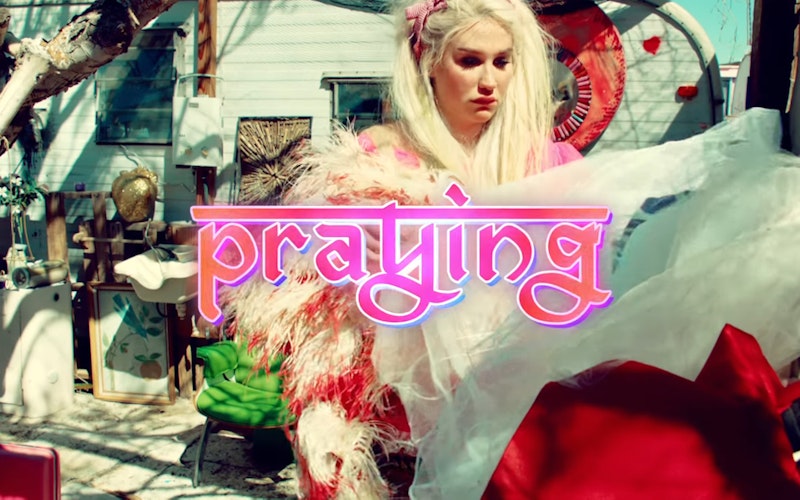
Music
Kesha’s Praying and the True Power of Prayer
Pop star Kesha has stunned fans and detractors alike with her epic new ballad, “Praying.” Years into her public and painful legal battle with producer Dr. Luke over alleged sexual abuse, the former symbol of the party life breaks her musical silence with a Gospel-flavored song that dares to turn a celebrity feud into a reflection on the forgiveness and freedom that comes through prayer.
“Praying” dropped with a stunning video and a brief letter outlining its origins and intent. Though she goes out of her way in her letter to distance herself from anything resembling a specific dogma or denomination, the video crams more biblical imagery per frame than anything I’ve seen in years. It begins with spoken words over black-and-white images of Kesha floating, defeated, in the sea on some kind of destroyed vessel. This opening acts as a sort of prayer before the prayer (a variation on King David’s sense of abandonment in Psalm 13) and sets up a continuing juxtaposition with the explosions of color to come. Kesha wonders:
If I am alive, why? Why? If there is a God or whatever, something, somewhere, why have I been abandoned by everyone and everything I've ever known? I've ever loved? Stranded. What is the lesson? What is the point? God, give me a sign or I have to give up. I can't do this anymore. Please just let me die. Being alive hurts too much.
Then the music, played sparsely on what sounds like an ancient piano, begins. In the scenes that follow Kesha moves through the immersive and devotional outsider art project known as Salvation Mountain, wearing a variety of brightly colored dresses, shimmering angel costumes, and wildly applied rainbow makeup. There are brief moments in which she is hunted by salivating pigs. The symbolism is anything but subtle, even as it also recalls Paul’s powerful words in Philippians: “Do not be anxious about anything, but in every situation, by prayer and petition, with thanksgiving, present your requests to God. And the peace of God, which transcends all understanding, will guard your hearts and your minds in Christ Jesus.
Paul goes on to say that if we dwell on things that are good, true, honorable, pure, lovely, and of good reputation, God’s peace will be with us. Salvation Mountain, in this case, serves as a dwelling place in the video. The ultimate result of the forgiveness Kesha has extended is that she herself can do the impossible. The video ends with her walking on water and watching what might be Jonah’s whale swim gently into a rainbow-gilded sunset.
Interestingly, Kesha’s prayer is that her enemy, her victimizer, would not be vanquished, but would be redeemed. “I hope you find your peace, falling on your knees, praying,” she implores. It seems that, having found a peace that passes her capacity for comprehension, she now hopes that the one who hurt her will find the same peace. You can practically feel Jesus’ words from the Sermon on the Mount bleeding from the screen as Kesha literally prays for those who persecute her.
A prayerful heart is a heart that is ready to be healed.
Prayer is often misconstrued, by both the faithful and the filthy. Often we focus on asking God for stuff. Sometimes we pray as if we’re letting God in on some facts of which he may not be aware. Other times we pray as if we can muster God’s blessing upon whatever it is we intend to do next. And if the Christian community often misunderstands the form and function of prayer, how likely is it that the spiritual passersby would get it right? Well, maybe more likely than I would have thought.
Someone once reminded me that there was nothing I could pray that God didn’t already know. I wasn’t hipping him to anything at all. The point of prayer, I then began to experience, is that it changes the pray-er. Prayer has the power to recalibrate our hearts and minds to be in line with God’s law of love. Prayer disarms the warfare in our hearts. It allows us, sometimes, to see what’s really going on in and around us. Prayer, when we do it right, humbles us. It’s nearly impossible to fight effectively when we are on our knees. It’s not that the words we say are magic or that the right combination of phrases can manipulate God into doing this or that. But a prayerful heart is a heart that is ready to be healed.
There is a reason, I suspect, that the idea of “prayer” is such a powerful concept for Christians and non-Christians alike. It can beckon us into a place of vulnerability, fragility, and—ultimately—peace. A.W. Tozer explained it this way:
The yearning to know what cannot be known, to comprehend the incomprehensible, to touch and taste the unapproachable, arises from the image of God in the nature of man. Deep calleth unto deep, and though polluted and landlocked by the mighty disaster theologians call the Fall, the soul senses its origin and longs to return to its source.
Here’s hoping that Kesha’s prayer, along with our own, continues to grow in its submission to God’s love. We should all be somewhere praying.
Topics: Music, Culture At Large, Arts & Leisure